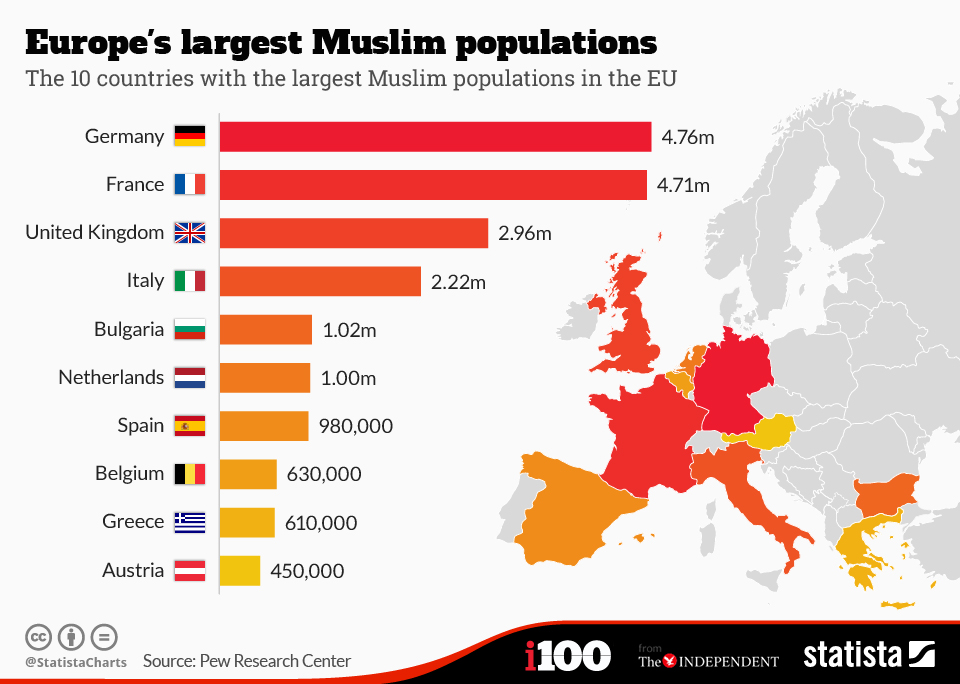As of recent estimates, Germany is home to a significant Muslim population, with numbers that reflect the country’s historical and contemporary immigration patterns. The exact number of Muslims in Germany can vary depending on the source, but estimates generally suggest that there are around 5 million Muslims living in the country. This figure represents approximately 6% of Germany’s total population.
Historical Context
The presence of Muslims in Germany dates back to the early 20th century, with notable increases occurring in the latter half of the century. The first significant wave of Muslim migration to Germany began in the 1960s, when the country, amid its post-war economic boom, signed labor agreements with several countries, including Turkey, Morocco, and Tunisia. These agreements allowed for the recruitment of foreign workers to fill labor shortages. Many of these workers came from Muslim-majority countries, and while many initially intended to return home, a significant number stayed and settled in Germany.
In addition to labor migration, the political and economic upheavals in various parts of the world, such as the Yugoslav Wars of the 1990s and the more recent conflicts in the Middle East and North Africa, have led to increased asylum-seeking and refugee migration to Germany. This has further diversified the Muslim population in the country.
Demographic Breakdown
The Muslim population in Germany is diverse, encompassing a wide range of ethnicities, cultures, and religious practices. Among the largest groups are Turkish Muslims, who make up a substantial portion of the Muslim community in Germany. Other significant groups include Arabs, Kurds, and people from South Asia. The diversity within the Muslim community reflects the various waves of migration and the differing backgrounds of the individuals who have come to Germany.
Religious and Cultural Practices
Islamic practices in Germany are varied, with the community engaging in a range of religious, cultural, and social activities. There are numerous mosques and Islamic centers across the country that serve as places of worship, community gathering, and education. These institutions are vital for maintaining religious practices, providing support services, and fostering community cohesion.
In addition to mosques, Islamic schools and cultural organizations contribute to the religious and cultural life of Muslims in Germany. These institutions offer education that includes religious instruction as well as general education, helping to integrate young Muslims into German society while also preserving their cultural heritage.
Integration and Challenges
The integration of Muslims into German society has been a subject of significant discussion and debate. While many Muslims have successfully integrated into various aspects of German life, challenges remain. Issues such as socio-economic disparities, discrimination, and cultural differences have affected the experiences of many within the Muslim community.
In recent years, there has been increased attention to the integration of Muslim immigrants and their descendants. Efforts have been made to address challenges such as unemployment and educational attainment among the Muslim population. Additionally, there are initiatives aimed at fostering dialogue and understanding between Muslim communities and the broader German society.
Political and Social Dynamics
The presence of a substantial Muslim population has also influenced German politics and social dynamics. Issues related to immigration, religious freedom, and multiculturalism have been central to political debates. Political parties and policymakers have addressed these issues in various ways, with some advocating for more inclusive policies and others focusing on stricter immigration controls.
The rise of populist and right-wing political movements in Europe, including Germany, has also impacted the discourse around Islam and Muslims. These movements often focus on issues related to national identity, security, and cultural differences, which can affect the perception and treatment of Muslim communities in Germany.
Contributions to Society
Muslims in Germany have made significant contributions to the country’s cultural, economic, and social fabric. Many members of the Muslim community are actively involved in various sectors, including business, education, science, and the arts. Their contributions enrich German society and reflect the diverse backgrounds and talents of the Muslim population.
In the realm of cultural exchange, Muslim artists, musicians, and writers have added to Germany’s rich cultural landscape. Additionally, the presence of diverse culinary traditions from Muslim-majority countries has become an integral part of Germany’s food culture.
Future Trends
Looking ahead, the Muslim population in Germany is expected to continue growing, influenced by factors such as migration patterns, birth rates, and socio-political changes. As this demographic evolves, the challenges and opportunities associated with integration, social cohesion, and cultural exchange will remain important areas of focus.
Efforts to foster greater understanding and cooperation between Muslim communities and the broader German society will be crucial in shaping the future. Promoting inclusive policies, combating discrimination, and encouraging dialogue are key components in ensuring that Germany remains a diverse and harmonious society.
In summary, Muslims in Germany represent a significant and growing segment of the population. Their presence reflects both historical migration patterns and contemporary global dynamics. While there are challenges to overcome, the contributions and integration of Muslims into German society highlight the country’s ongoing journey towards inclusivity and diversity.
